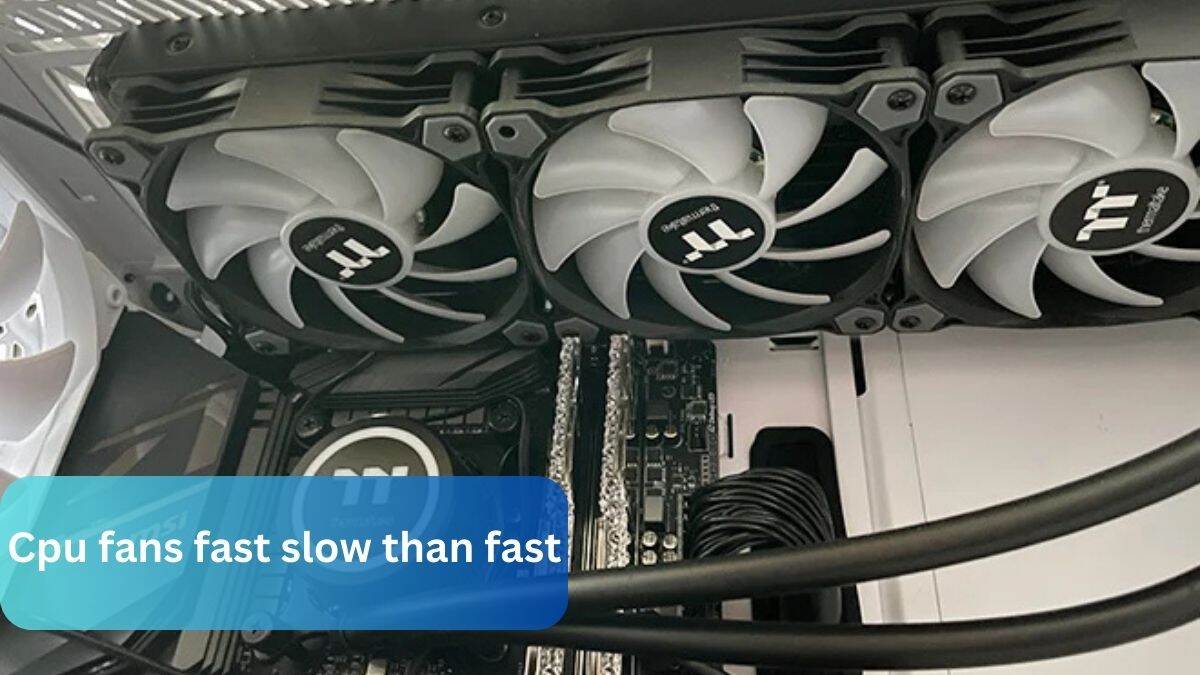CPU fans speed up, slow down, and then speed up again due to temperature changes in the processor. When the CPU gets hot, the fan speeds up to cool it down. As the temperature drops, the fan slows down. Sudden workload changes or incorrect fan settings can cause this fluctuation.
I noticed my CPU fans fast slow than fast when I was gaming, especially during intense moments. After cleaning out some dust and adjusting the fan settings in the BIOS, the issue became less frequent.
In this article, we will discuss “Cpu fans fast slow than fast”.
Table of Contents
Understanding the Behavior of CPU Fans
CPU fans are crucial for keeping your processor cool, but have you ever noticed them ramping up and down in speed? This behavior can be perplexing, especially when you’re trying to concentrate on a task or enjoy a quiet computing experience.
Why Do CPU Fans Change Speed?
CPU Temperature Regulation
Your CPU fan’s primary job is to manage the processor’s temperature. When your CPU gets hot due to intensive tasks like gaming or rendering, the fan speeds up to dissipate heat effectively. Conversely, it slows down during light tasks or idle periods to conserve energy and reduce noise.
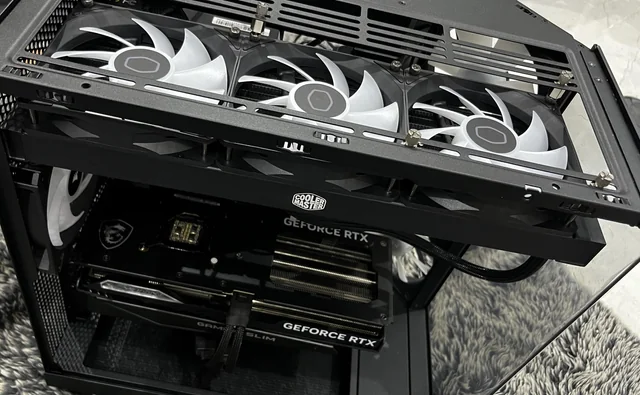
BIOS and Fan Curve Settings
The BIOS is like the brain behind your computer’s cooling system. Fan curves are pre-set thresholds in the BIOS that determine how fast your fan spins based on the CPU’s temperature. If these settings are too aggressive or mismatched, you might experience constant speed fluctuations.
What Causes CPU Fans to Alternate Between Fast and Slow?
Sudden Workload Changes
When your CPU quickly switches from handling light tasks to heavy ones, the fan reacts by ramping up speed to manage the heat spike. This can create a fast-slow-fast pattern.
Dust and Obstruction in the Cooling System
Dust accumulation on the fan blades or heatsink can obstruct airflow, causing the fan to struggle to maintain optimal cooling. This can lead to erratic speed changes.
Software or Driver Issues
Sometimes, outdated drivers or conflicting software can send mixed signals to the fan, resulting in inconsistent speeds.
Read Most Important: Do AVX CPU Cores Fixed on Mac – Ultimate Guide 2024!
Common Scenarios of Fast-Slow-Fast CPU Fan Speeds
High CPU Usage During Gaming or Heavy Tasks
During gaming or video rendering, your CPU may alternate between high and moderate usage, causing the fan to fluctuate in speed.
Idle vs. Active States of the Computer
If your computer frequently switches between idle and active states, the fan adjusts accordingly, leading to noticeable speed changes.
Faulty Sensors or Overheating
A malfunctioning temperature sensor can misreport the CPU’s heat levels, prompting unnecessary fan adjustments.
Diagnosing the Problem
Checking CPU Temperatures
Use tools like HWMonitor or Core Temp to check if your CPU is overheating. If temperatures are consistently high, it’s a clear indicator of a cooling issue.
Inspecting the Fan and Heatsink
Regularly inspect your fan and heatsink for dust buildup. Cleaning these components can resolve most speed fluctuation issues.
Reviewing BIOS Settings
Ensure your fan curves are appropriately configured in the BIOS. Overly aggressive settings can cause rapid fan speed changes.
Fixing CPU Fan Speed Issues
Updating Drivers and Software
Outdated drivers can cause erratic fan behavior. Update your motherboard and fan control software to ensure smooth operation.
Cleaning and Replacing Hardware Components
Sometimes, all it takes is a good cleaning session. If the fan is damaged or worn out, consider replacing it with a high-quality model.
Advanced Troubleshooting Tips
For persistent issues, you may need to reset the BIOS or consult professional hardware support.
Preventing Future CPU Fan Speed Problems
Regular Maintenance Tips
Clean your PC every few months to prevent dust buildup and maintain optimal airflow.
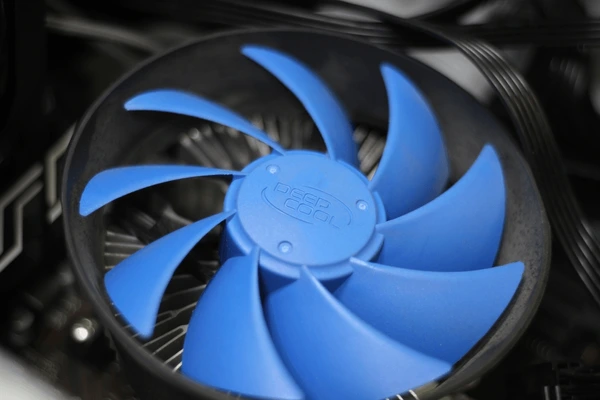
Upgrading to a More Efficient Cooling Solution
Investing in a high-quality CPU cooler can reduce fan noise and improve thermal performance.
Setting Up Proper Airflow in the PC Case
Ensure your PC case has proper ventilation and strategically placed intake and exhaust fans for maximum cooling efficiency.
PC fans randomly speed up when idle
This can happen if background processes or software updates are running, causing temporary CPU spikes. Check for unnecessary programs running and clean the system of dust for smoother airflow.
CPU fan spinning fast on startup
It’s normal for the CPU fan to spin fast on startup as the system checks its components. This process usually lasts a few seconds before the fan slows down.
Read Most Important: wall mounted industrial cabinet with cpu modules – Full Guide 2024!
Why does my PC fan speed up and slow down?
The fan adjusts its speed based on the CPU’s temperature. Rapid changes in workload or misconfigured fan settings can cause this behavior.
Oscillating fan speeds up and slows down
Oscillating speeds can be due to faulty temperature sensors, inconsistent power supply, or dirt affecting fan movement. Cleaning and checking fan settings can resolve the issue.
CPU fan constantly changing speed
This often happens when the fan curve in the BIOS is too aggressive. Adjusting the fan curve to more stable settings can help reduce the fluctuations.
CPU fan spinning too fast
A fan spinning too fast might indicate high CPU temperatures. Check for dust buildup, ensure the cooler is properly installed, and verify if thermal paste needs reapplying.
CPU fan smoothing
Smoothing refers to adjusting the fan curve to minimize abrupt speed changes. This can be done in the BIOS or fan control software by setting gradual transitions.
Ceiling fan spinning too fast
A ceiling fan spinning too fast can be due to a faulty speed regulator or incorrect wiring. Replace the regulator or check the wiring to fix the issue.
Why does my fan run fast then slow?
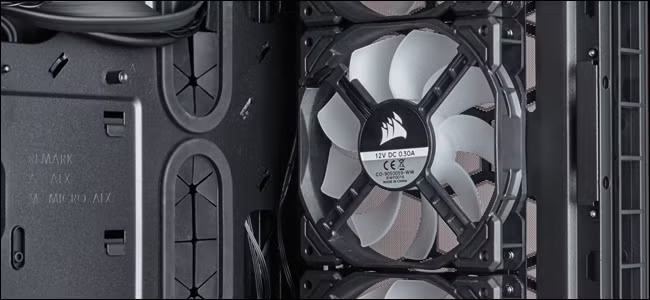
Fans adjust their speed based on the CPU temperature. Sudden workload changes or aggressive fan curve settings can cause the fan to alternate between fast and slow speeds.
Why is my computer fan running so fast and it’s not doing anything?
This could be due to high temperatures from background tasks, dust buildup, or faulty temperature sensors. Check for hidden processes and clean your system.
Should my CPU fan be at full speed?
No, it doesn’t need to run at full speed unless the CPU is under heavy load or overheating. Adjust the fan curve in the BIOS for efficient cooling.
Why is my CPU fan speed too fast and too loud?
The fan may be compensating for high temperatures or improper cooling. Clean the fan, reapply thermal paste, and ensure good airflow in your PC case.
Why is my fan speed going up and down?
This behavior is usually caused by changing CPU temperatures or aggressive fan curve settings. Adjust the fan curve for smoother transitions.
Why is my fan not going full speed?
The fan may be limited by the BIOS settings or power supply. Check the fan curve settings and ensure it’s properly connected to the motherboard.
Read Most Important: pascal safety calculator result pdf – Ultimate Guide 2024!
How do I fix my CPU fan speed?
Use BIOS settings or fan control software to adjust the fan curve. Clean the fan and ensure no dust or obstructions are present.
How do I know if my PC fan is failing?
Signs of a failing fan include unusual noise, inconsistent speeds, or the fan not spinning at all. Test it by monitoring RPM in the BIOS or software.
How do I know my CPU?
You can check your CPU model in the system properties, BIOS, or through tools like CPU-Z.
Is it OK to run CPU fan at 100 all the time?
Running at 100% all the time isn’t ideal as it can cause unnecessary wear and noise. It’s better to adjust the fan speed based on cooling needs.
How long do CPU fans last?
CPU fans typically last 3-5 years, depending on usage and maintenance. Regular cleaning can extend their lifespan.
Should my CPU fan be intake?
No, CPU fans are usually designed to exhaust hot air away from the heatsink, not intake. Ensure it’s oriented correctly for optimal cooling.
Why is my PC fan not spinning fast?
Check if the fan is securely connected to the motherboard and not obstructed by dust. If the problem persists, inspect BIOS settings or replace the fan.
Why is my cooling fan running slow?
A cooling fan running slowly could be due to dust buildup on the blades or motor, insufficient power supply, or wear and tear of internal components like bearings. In computers, incorrect BIOS settings or a failing fan motor could also cause slow speeds. Cleaning and inspecting the fan for damage can help fix this issue.
Why is my standing fan running slow?
A standing fan might run slow due to dust accumulation, a worn-out motor, or a faulty capacitor. Poor lubrication of the motor shaft can also cause resistance, leading to slower speeds. Cleaning, oiling the motor, or replacing damaged components often resolves the problem.
How do I know if my computer fan is dying?
Signs of a dying computer fan include unusual noise (like grinding or rattling), inconsistent or slow spinning, overheating of the system, or complete failure to spin. Monitoring the fan’s RPM in BIOS or using software tools like HWMonitor can help detect issues.
Why is my PC fan blowing so hard?
A PC fan blowing hard indicates the system is working to cool down high temperatures. This can be due to heavy workloads like gaming or rendering, poor airflow in the case, dust accumulation, or failing thermal paste. Ensure the case is well-ventilated and clean to reduce the load on the fan.
How to clean fans in PC?
To clean PC fans:
- Power off and unplug your PC.
- Use compressed air to blow out dust from the blades.
- Wipe the blades with a lint-free cloth and isopropyl alcohol if necessary.
- Avoid touching the fan’s motor or over-spinning the blades while cleaning.
- Ensure all fans are reconnected properly after cleaning.
What percentage should CPU fan run at?
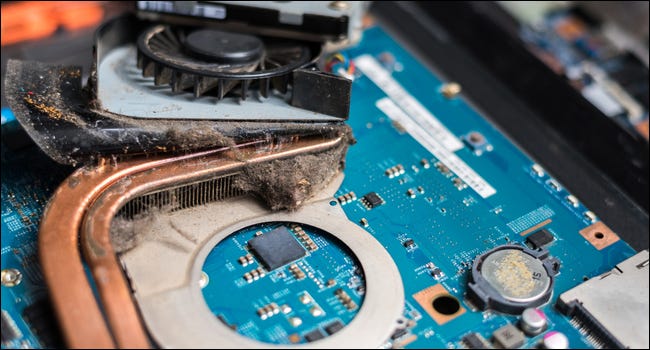
The optimal percentage for a CPU fan depends on your cooling needs. Typically, a fan should run at around 30-40% speed during idle or light tasks and increase to 70-100% under heavy load. Setting the fan curve in the BIOS helps maintain balanced cooling and noise levels.
Does CPU fan RPM matter?
Yes, CPU fan RPM (Revolutions Per Minute) matters as it directly affects the cooling performance. Higher RPM means better cooling but can lead to increased noise. An efficient cooling system balances RPM and noise for optimal performance.
Read Most Important: Can You Use 70 Isopropyl Alcohol To Clean The CPU – Ultimate Guide 2024!
FAQs
Why does my CPU fan suddenly speed up and slow down?
This typically happens due to sudden changes in CPU workload or temperature, prompting the fan to adjust its speed.
Is it harmful if my CPU fan constantly changes speed?
Not necessarily, but it could indicate underlying issues like overheating, dust buildup, or misconfigured settings.
How do I stop my CPU fan from being so loud?
Adjust your fan curves in the BIOS or consider upgrading to a quieter cooling solution.
Can I replace a noisy CPU fan with a quieter one?
Yes, upgrading to a high-quality fan with better noise dampening can significantly reduce noise.
How often should I clean my CPU fan to avoid speed fluctuations?
Cleaning your CPU fan every 3-6 months is a good practice to maintain consistent performance.
Conclusion
In conclusion, CPU fan speed fluctuations are usually a result of temperature changes, sudden workload shifts, or dust buildup. Regular maintenance, such as cleaning the fan and adjusting BIOS settings, can help minimize these fluctuations. If problems persist, replacing outdated components or upgrading to a more efficient cooling solution might be necessary. Proper airflow management and periodic monitoring ensure optimal cooling performance, keeping your system running smoothly and quietly.
Read Most Important:
